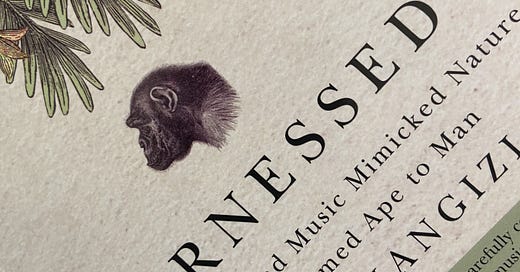Harnessed: neither innate nor a blank slate
reading Mark Changizi's Harnessed: How Language and Music Mimicked Nature and Transformed Ape to Man
Over the past few years, I have come under the impression that my former way of looking at ideas and motivation, at ideology and free will, a philosophy and its application, was incorrect, or at least limited in its explanatory potential. Feeling that my perspective as a cultural historian therefore was restrictive, I have read and reflected on theories of psychology and evolutionary psychology. Such ways of interpreting human behavior may be less self-congratulatory (‘I am, I think, I do’) but are closer to my experience of the post-’rona world. In this light, it probably comes as no surprise that I ran into Changizi’s presence on-line. Contrary to many self-declared ‘libertarians’ and ‘classical liberals’, he has stuck to a consistently pro-liberties approach during these rather confusing times.
There were more specific reasons for me to order some of his books, too, the first of which is related to my doubts and searches as described above. Iain McGilchrist has recently enriched me with the understanding that song precedes language for our species. I picked up Harnessed with the hope of deepening my understanding of this remarkable hypothesis about our evolution. Another reason for my interest to be tweaked is that some years ago I dabbled with the - as far as I am aware - unexplored territory of the ‘philosophy of food’ (you can find a republished sample here). Now music and food are two of the arts (and whether cuisine truly, and ‘formally’, represents an (applied) form of art I find the least interesting question) which are non-conceptual in nature. While (well-executed) creations of these art forms move us, explaining why they do so is a greater challenge than for the visual arts or literature. In comes Changizi.
Changizi’s hypothesis is that language and music adapt our perceptual and processing systems as developed to make sense of physical reality in our evolutionary environment. This harnessing of our brain points at what I think is the most fundamental philosophical contribution of Changizi’s thought. Debate on language acquisition has traditionally revolved around the innate/tabula rasa juxtaposition. Changizi shows us there is another possibility still: while language (or music) is not a part of our hardware, it may adapt a specific part thereof. He substantiates his theory by analyzing the auditory elements of our environment, and showing how the characteristics of colliding objects and the subsequent sliding and ringing of these blows are reflected in the sounds our languages are composed of.
For music, his contention is different. Whereas language imitates the auditory patterns produced by our physical environment, music reflects the sounds of human interaction. I cannot do justice to the subtlety - and elaborateness - of the argument within the span of a short review, so I will encourage readers to investigate for themselves. He renders plausible that different aspects of music (such as beat, rhythm, loudness, and melody) are imitations of human movement, while previous attempts at linking these to our experience (as in linking loudness to the effort or momentum of action, for example) fail to explain the recurring patterns of our musical archive.
So why does music move us? My mother, who was a piano teacher, always said - and I imagine she got this from somewhere or someone as yet unidentified - that music transpires through tension and release. With Changizi’s book behind me, I can try to rephrase that as ‘encounter and surrender’, or ‘anticipation and loss’. We would need a poet to formulate this in a way that touches us, this time conceptually, in a way comparable to music. What I imagine could be an interesting addition to his work is to consider how harmony might be what integrates physical and human reality. Leaving atonal music aside, we construct harmony after nature, in the sense that the harmonics offered to us by ringing objects are faithfully copied by us - be it in varying combinations. And a question I would be curious to ask the author is whether he ever considered writing this book the other way around.
If you’re intrigued by the role language and music play in our lives, or maybe if your ‘only’ interest is to reweigh the old arguments for innate knowledge versus the blank slate with hope of finding a real, and not a false, alternative, order your copy of Harnessed and let me know what you think.



